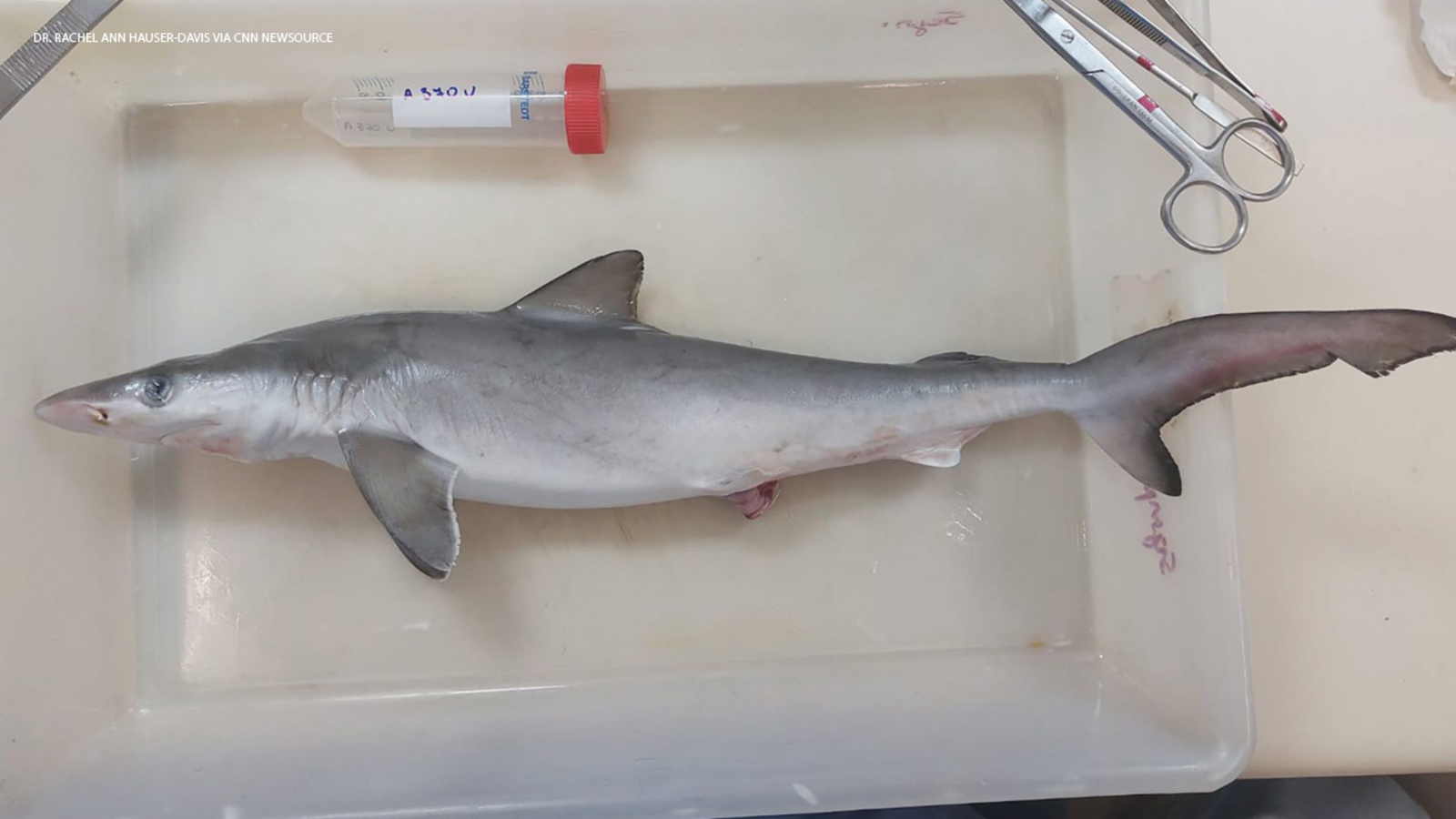Sharks living off the coast of Brazil have tested positive for cocaine, according to new research, the first time that the drug has been detected in free-ranging sharks.
Scientists tested 13 Brazilian sharpnose sharks in the waters off the city of Rio de Janeiro and found cocaine present in both the liver and muscle tissue of all 13 specimens, according to a paper by researchers at the Oswaldo Cruz Foundation in Brazil sent to CNN on Tuesday.
The species was chosen due to its small size and the fact that it lives in a small area of coastal waters, where it is exposed to significant contaminant discharges for its entire life cycle, according to the study.
Cocaine levels were around three times higher in muscle tissue than liver tissue, according to the study, while female sharks had higher cocaine concentrations in muscle tissue compared to males.
A Brazilian sharpnose shark tested positive for cocaine, according to researchers.
Dr. Rachel Ann Hauser-Davis via CNN Newsource
Cocaine pollutes the sea due to sewage discharges from humans who use the drug, as well as the illegal laboratories that produce it, study co-author Enrico Mendes Saggioro, an ecotoxicologist at the foundation, told CNN on Tuesday.
Cocaine consumption has risen massively around the world in recent decades, according to the study.
Around 22% of users live in South America, the paper added, with Brazil the second largest consumer market in the region. Increased consumption and poor sewage treatment infrastructure has made for increased cocaine levels in the sea, say researchers.
Previous research suggested that cocaine dumped at sea by traffickers could be responsible for contamination, but that is not the case here, said Mendes Saggioro.
“We don’t usually see many bales of coke dumped or lost at sea here, unlike what is reported in Mexico and Florida,” he said.
Studies have not been conducted to determine whether cocaine damages the sharks’ health, explained Mendes Saggioro and study co-author Rachel Ann Hauser Davis, a biologist at the foundation, but previous research has shown that the drug harms other animals such as fish and mussels.

Another shark that tested positive for cocaine forms part of the study conducted by researchers.
Dr. Rachel Ann Hauser-Davis via CNN Newsource
“It is probable, although not yet proven that exposure would have deleterious physiological effects on the sharks,” they said in a joint statement.
In addition, it is not possible to prove any effects on the sharks’ behavior due to a lack of research, but “cocaine targets the brain and hyperactive and erratic behaviour has been noted in other animals,” the pair explained.
Hauser Davis said that it is “very likely” that crustaceans, fish and other animals that the sharks prey on are also contaminated with cocaine.
The potential effects on human health are also difficult to establish, the pair explained, although “cocaine has already entered the food chain, as sharks are routinely eaten by humans in Brazil and in many other countries.”
Next, the team plans to analyze other species of shark, as well as rays that live in river estuaries, said Mendes Saggioro.
“We also plan on assessing migratory fish, such as mullet, to verify if migratory behavior affects cocaine accumulation,” he added.
The study appears in the journal Science of the Total Environment.
In 2021, researchers found that brown trout can become addicted to the illegal drug methamphetamine when it accumulates in waterways.
“Fish are sensitive to adverse effects of many neurologically active drugs from alcohol to cocaine and can develop drug addiction related to the dopamine reward pathway in a similar manner as humans,” lead study author Pavel Horky, a behavioral ecologist from the Czech University of Life Sciences in Prague, told CNN via email at the time.
In 2019, researchers in the United Kingdom announced they had found traces of illicit drugs, pharmaceuticals and pesticides in samples of freshwater shrimp.
And the previous year, scientists working in Puget Sound, an inlet of the Pacific Ocean along the northwest coast of Washington state in the US, said that mussels in the area had tested positive for the prescription opioid oxycodone.
The-CNN-Wire & 2024 Cable News Network, Inc., a Warner Bros. Discovery Company. All rights reserved.
